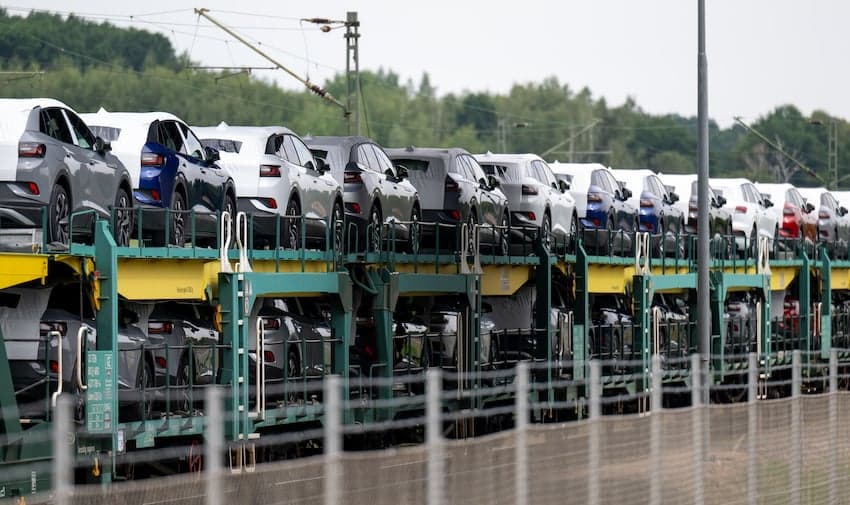Germany needs 'reality check' to meet electric car targets

Germany is likely to "significantly miss" the federal government's target of 15 million electric vehicles by 2030 unless it moves quickly to stimulate sales, according to the director of the Center of Automotive Management (CAM).
Speaking in Bergisch Gladbach on Tuesday, Stefan Bratzel called for a "reality check" as he stressed the need to align political goals with stronger incentives.
Currently, the government provides a subsidy of up to €4,500 for purchasing an electric car. Starting from September 1st commercial buyers, who account for two-thirds of new registrations, will no longer receive the subsidy. Private buyers will still qualify but from next January the subsidy will be lowered to a maximum of €3,000.
The number of battery electric vehicles (BEVs) in Germany reached nearly 1.2 million in the first half of the year. Fully electric vehicles now make up 2.4 percent of the total stock of over 49 million vehicles. According to the Federal Motor Transport Authority, 220,000 BEVs were newly registered in the first half of the year. Bratzel estimated that 750,000 new BEVs would be necessary this year to stay on target. However, he deemed only 450,000 new registrations as realistic. Based on the current growth trajectory, the expected stock of electric vehicles by 2030 would be seven to eight million - half of the government's planned target.
The International Organization of Motor Vehicle Manufacturers (OICA) called for an extension of subsidies to help stay on track. "The market for electric cars has only reached roughly the previous year's level in 2023 so far."
According to Bratzel, most fully electric vehicles on German roads are from Volkswagen (207,000), followed by Tesla (146,000) and Renault (113,000). These are followed in the mid-range by Hyundai, Smart, BMW, Opel, Audi, Mercedes, and Fiat, while Chinese brands like MG (17,000), Volvo (9,500), BYD (1,448), Nio (844), and Great Wall (640) are still relatively less visible. The proportion of SUVs and off-road vehicles among fully electric cars has grown from just under 26 percent to over 35 percent since mid-last year, according to CAM.
Comments
See Also
Speaking in Bergisch Gladbach on Tuesday, Stefan Bratzel called for a "reality check" as he stressed the need to align political goals with stronger incentives.
Currently, the government provides a subsidy of up to €4,500 for purchasing an electric car. Starting from September 1st commercial buyers, who account for two-thirds of new registrations, will no longer receive the subsidy. Private buyers will still qualify but from next January the subsidy will be lowered to a maximum of €3,000.
The number of battery electric vehicles (BEVs) in Germany reached nearly 1.2 million in the first half of the year. Fully electric vehicles now make up 2.4 percent of the total stock of over 49 million vehicles. According to the Federal Motor Transport Authority, 220,000 BEVs were newly registered in the first half of the year. Bratzel estimated that 750,000 new BEVs would be necessary this year to stay on target. However, he deemed only 450,000 new registrations as realistic. Based on the current growth trajectory, the expected stock of electric vehicles by 2030 would be seven to eight million - half of the government's planned target.
The International Organization of Motor Vehicle Manufacturers (OICA) called for an extension of subsidies to help stay on track. "The market for electric cars has only reached roughly the previous year's level in 2023 so far."
According to Bratzel, most fully electric vehicles on German roads are from Volkswagen (207,000), followed by Tesla (146,000) and Renault (113,000). These are followed in the mid-range by Hyundai, Smart, BMW, Opel, Audi, Mercedes, and Fiat, while Chinese brands like MG (17,000), Volvo (9,500), BYD (1,448), Nio (844), and Great Wall (640) are still relatively less visible. The proportion of SUVs and off-road vehicles among fully electric cars has grown from just under 26 percent to over 35 percent since mid-last year, according to CAM.
Join the conversation in our comments section below. Share your own views and experience and if you have a question or suggestion for our journalists then email us at [email protected].
Please keep comments civil, constructive and on topic – and make sure to read our terms of use before getting involved.
Please log in here to leave a comment.